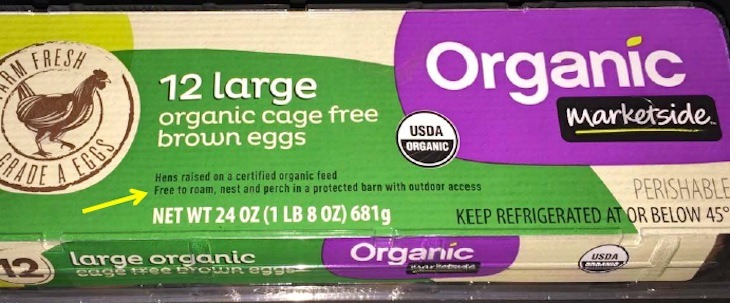Wal-Mart, Cal-Maine sued for deceptive organic egg label
by January 9, 2018 2:35 pm 2,819 views

Wal-Mart and its major egg supplier Cal-Maine Foods were sued Monday (Jan. 8) in the U.S. District Court of Northern California by a shopper claiming unlawful and fraudulent business practices with the labeling of the Marketside Organic eggs — a private label product made for Wal-Mart by Cal-Maine.
Plaintiff Donnie Lee Gibson II is seeking class action status on behalf of himself and others similarly situated. The suit claims Wal-Mart is misrepresenting products to customers with false labeling claims which is a violation of state and federal laws.
The main product noted in the case are organic cage-free brown eggs under the private brand Marketside. Also on the front of the egg crate the retailer and supplier claim “Hens raised on certified organic feed, Free to roam, nest and perch in protected barn with outdoor access.”
The suit claims consumers pay considerably more for the organic eggs that allow birds outside access. The Marketside brand for non-organic cage-free egg cost on average $2.98 a dozen, the Organic Marketside cage-free eggs that allow hens outside access cost $3.97 a dozen, according to the suit. This compares to the Great Value (non-speciality egg) cost of $1.86 per dozen.
The suit claims an investigative team looked at a Cal-Maine organic egg facility near Chase, Kan., in October and found the large barns only had screened porches with limited access for birds to exit the building. The birds were not free to roam and peck the ground, the suit claims “outside access” is a stretch given only a few birds were seen out on the covered and screened porch area, while thousands of birds were crowded inside on four different levels.
“A reasonable consumer would not deem this outdoor access. Each porch can hold only a small fraction of the flock housed in the industrial barn. Indeed, inside one porch, only about one hundred of tens of thousands of hens—less than 1% of the flock—were visible. And inside another porch, there were fewer still. This is not outdoor access for the hens, as promised by defendants to the consumers paying a premium for it,” the suit notes.
Randy Hargrove, spokesman for the retail giant, told Talk Business & Politics, “We take this matter seriously. We hold our suppliers to high standards and are committed to providing our customers the quality products they expect.”
He said the retailer will review the complaint allegations, once served and will respond to the court.
Federal guidelines to meet the criteria for organic labeling must include year-round access for all animals to the outdoors, according to the U.S. Department of Agriculture protocol. Enclosed structures such as porches do fit that criteria.
The USDA introduced a proposal to amend the criteria for “outdoor access” in 2016. That amendment would have required animals have open-air access with at least 50% soil. This move was meant to increase consumer confidence about organic labels. The proposal was withdrawn by the USDA last year after industry opposition.
